J Quality Inn, 555 N Center City Pkwy, Esco. Park in the Very Back of the Property. Room 118.
The 'Moscow experiment' has seen the city undergo renewal efforts over the last five years to improve liveability. But what do Moscow's residents really think about the changes? We asked you to share your stories of life in the Russian capital, and reflect on whether Moscow is changing for better or worse.
The city centre may be seeing improvements in infrastructure and public space, but what about the suburbs? How involved have local citizens been in the changes? And what does the future hold for Moscow? We've rounded up a selection of your GuardianWitness contributions, comments and emails, which reveal the everyday experiences of Moscow's transformations:
Change in attitude changes people
As a born-and-raised Muscovite, I can say that this experiment succeded halfly, only because it has not finished yet. And it is not only about change in infrastructure which made Moscow a better place, it also brought a new generation of young people interested in the better future. For example from my own experience, I find more and more of my friends interested in programming and urban planning due to their visits to lectures provided by Gorky Park and Strelka. At the same time we see a rise in creativity in terms of services, such as "анти-кафе" ( anti-cafes) where you pay for time spent there rather than for coffee, hipster barbershops which are also popular among general population, affordable lunch places and so on. One of the most popular cafes "Циферблат" even opened one more cafe, not in Moscow but in Manchester, and it shows that there is a big change of service business, which became more oriented at people, rather than just their money.

About pedestrians and automobilists
Moscow has undergone massive change in the last five years, but the most obvious developments concern parks, streets, and general navigation in the capital. Most of the developments are surely positive: the city has seemed to get more air. There have appeared more walking paths, pedestrian zones have been expanded, some streets have been closed for traffic altogether, parks are being renovated, and new bicycle lanes are being offered now to city residents and its guests. However, there are negative changes as well, which have largely affected car owners: extension of the paid parking areas, and the increase of the average price, the need to navigate a bypass route in order to drive round pedestrian zones. But this coin has another side too: fewer cars in the centre means less exhaust fumes and cleaner air. Muscovites look forward to the old parks being renovated, and the new ones being opened. New plans make excited everyone: new metro stations, new roads, new bicycle lanes and pedestrian footpaths.
It's changing for better
Moscow is definitely changing for better now. As I see it, the authorities are trying to make a city a better place to live in, especially in remote residential neighborhoods, which is very good. Many parks were renovated, cycle lanes appeared. Moscow has become a nice place for long walks and cycling. The city has a lot to offer now including museums, and different events like exhibitons, summer outside activities and others. It's a pity that it takes so long but taking into account the size of the city and its population I can say the situation has changed even if compared to what it was like 4-6 years ago.
I grew up in Moscow and lived here until two years ago. My general impression is that the people making the decisions are trying to copy some European practices like bike rental, parks, etc, but the general success is limited.
The streets still belong to drivers, not to pedestrians, to an unbelievable extent. Another thing is that street retail was banned in an attempt to improve the city. It works for the city centre, where retailers really spoiled the overall impression of the scene, but 80% of Moscow is not a city centre. And there, this removal makes your life more difficult.
The positive trend is all these multiple festivals, exhibitions, etc, but the best of all these events were initiated by citizens, so I would say that it is due to improving integration of Muscovites into the global world. Overall, I should admit that I love my homeland, but there is still a far way to go to make the city as comfortable as it could be, and the incentives of the people in charge in many cases do not have a lot to do with the wellbeing of Muscovites.
- Ekaterina Ivanova
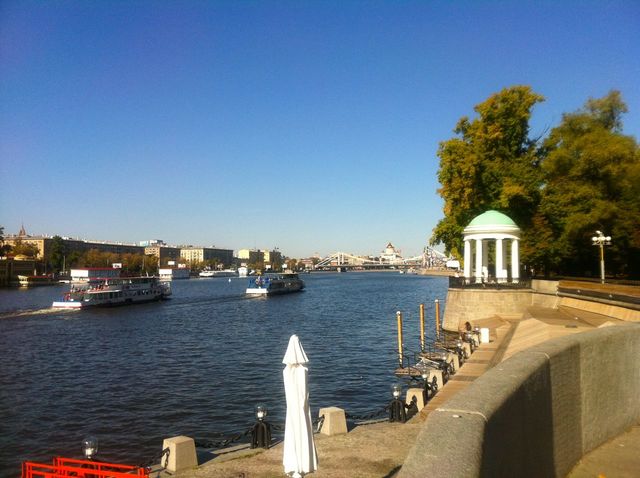
In the city
Gorky central park of culture and leisure
Better, definitely.
I was born in Moscow, emigrated to the UK ten years ago, and have been coming back at least once a year ever since. Although it's hard to tell from only a short visit, I can definitely see improvement in the capital: public transport operates better, local government services are better organised, the streets are cleaner... in my old neighbourhood (a very working-class, high-immigrant community), there are more 'high-street' shops appearing, less potholes on the roads, new playgrounds, new trees being planted and even the occasional fountain being built. These things may seem little and shallow, but I can certainly see improvement in this sense, at least.
It's better on the surface, but still has inclusion and institutional issues. What do I mean? I mean that no one really asked us, Moscow residents, about the changes being made in the city (although we really welcome a big part of them). And lack of inclusion and mutual trust between the residents is in the end the main problem of Moscow as a city and a community (in my opinion).
You can build as much fancy stuff as the money allows you to but if the Muscovites do not trust each other and don't consider this city to truly belong to them, it will never become a real city and will continue to exist as "a big village" with fancy parks, craft beer and bicycle service.
- Sergey Kurakov
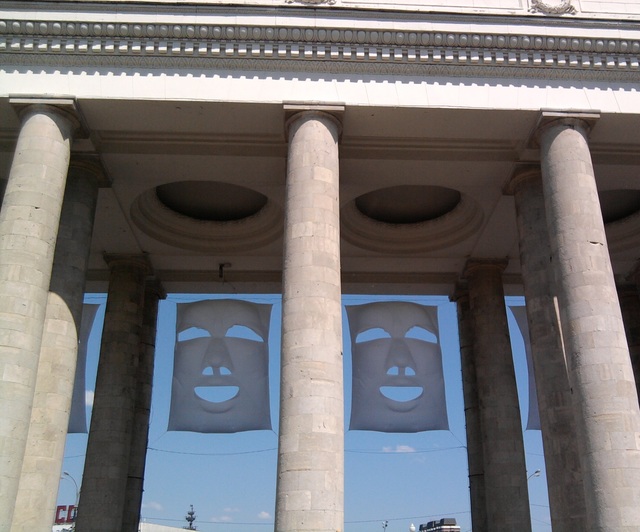
When you smiling
Moscow is beautiful with the history, but it's even more beautiful when history meets modern cultural programmes. This installation is a part of one of them. Such things can be seen in the city when we have holidays
The transformation of Gorky park was nice but it is now overly popular which means it is not so pleasant to go to. The boulevard ring has in the main been transformed and makes for a pleasant walk. The banks of the Moskva have been transformed and the walk from Red October down to Gorky park is now interesting, however I always feel that Moscow does not make as much as it's river as other cities (Paris or London for example) do. The area around modern tretyakov could be transformed into an area more like the south bank.
However the biggest killer of Moscow life are simply the size of the roads. They are everywhere and take priority over pedestrians. To really improve Moscow life would be deal with the massive structural change required for dealing with traffic. And that, unfortunately, costs more than plants.
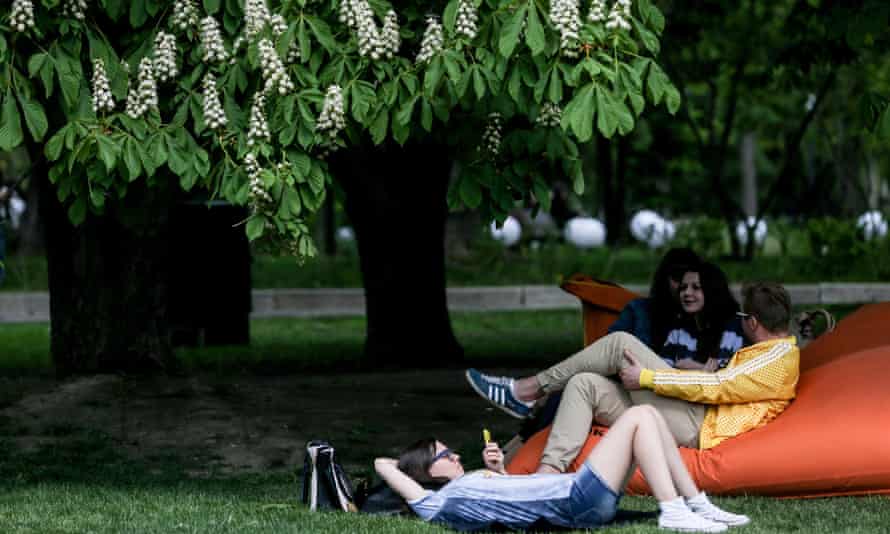
I was born in Moscow and truly love it. And this city inspired me to take an urban planning course: I honestly just couldn't figure out how one of the wealthiest cities in the whole world could experience such a plethora of problems ranging from car invasion to banal low visual and urban design culture.
Many things have changed for the better. A lot of new creative things emerged, such as anti-cafes, high-quality bars and famous Moscow art-clusters. These all influence the city and make it somewhat more democratic. On top of that, there are more direct influences on its physical fabric due to new urban design studios like StrelkaKB, Wowhaus and many others. However, the overall system is still underdeveloped.
Moscow is not really clean, it is over-reliant on cars and it seems not much action is taken to improve that; it's incredibly unfriendly to wheelchairs and people of similar mobility. We still get enormous unnecessary shopping malls planted close to the centre.
Moscow is a wonderful city and sure enough it is gradually developing, however, only in a discrete, tactical way, largely and mostly driven by private interests. The public sector, in turn, seems to provide no clear strategic policy to turn Moscow in a healthy modern democratic city with all its problems tackled in one way or another.
- dmitryBooM
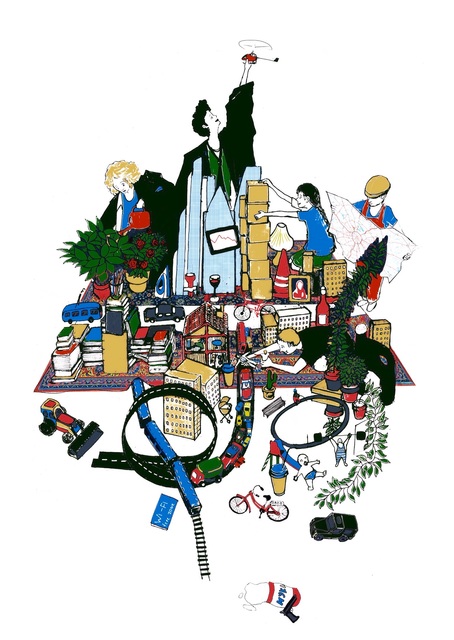
Moscow - is a big village. Moscow - is a big playground
With each new decade, Moscow changes its appearance. In the eighties - the Olympics, with stadiums and Pepsi, in the 90s - advertising and kiosks, in the 2000s - the terrifying statues and shopping centers. What can I say about our time? ... I would have united all in one word: REFINEMENT . "Live not survive" - the main task of urban planners today. Some of the most notable changes are: The renovation of parks, which is now not so bad for a walk, especially in the evening. Playgrounds became the favorite place of kids, not homeless people and alcoholics. Also, fitness trainers and horizontal bars right on the street, enhanced pedestrian road in the center, bicycle parking system. Moreover, greatly improved the situation on the roads, that can please many motorists, which sit half of life in a traffic jams, and, of course, wi-fi in underground, this innovation was the most pleasurable one. Moscow has long ceased to have a certain aesthetic. It shuffled so many different epochs and ideologies, that with such a level of disharmony and diversity can be compared only Berlin. Living in a city like this becomes normal to see the temple of the 18th century standing near panel building of Khrushchev era. However, our current mayor with all forces, is trying to find harmony in the this chaos. Is this Sisyphean task or not, only future will tell.
I have lived in Moscow for nearly 11 years. It's obvious to anyone who knows the city well that the centre of Moscow, within the Garden Ring, has changed for the better. Initiatives like paid parking have made it a better place for both drivers and pedestrians. The parks like Gorky and Sokolniki provide an environment for all year round relaxation and entertainment.
However, life in the very centre Is like a fairytale. Someone said Moscow is not Russia and Russia is not Moscow. Within the Garden Ring there is a third country and what happens there cannot be compared to what happens in the suburbs of Moscow.
Moscow seems a city out of control despite the efforts of some well intentioned people to improve it. But excessive development without the necessary investment in infrastructure is just creating further issues and pushing the problems away from the very centre but into the sleeping districts where the majority of Muskovites live.
- Keith Smith, via email
I live in the suburbs (Dolgoprudny) and have to say that in the last three years things have started to improve. Greener spaces, greater emphasis on people clearing up after themselves (one local park by the canal used to just resemble a rubbish tip, but now is a great place and hugely popular). Of course it's relative - the starting point was very low and there is still much that needs to be done. However, I have actually witnessed a change taking place.
I lived in Moscow between 2003 and 2014. The fact that it hasn't changed dramatically is the good news. There have been some large-scale infrastructure projects, such as the building of Moscow City. But for the most part, they've managed to leave the essence of the city in tact. Anyone who's lived in the city, understands the concepts of 'communal yards' and the local 'produktiy,' can speak to the charm of Moscow. One huge change, however, has been the investment in urban renewal. The city parks have been completely transformed in the past 5-6 years alone. Gorky Park, Ismailova, Sokolniki, VDNK and others are forested, clean and all have free WiFi. Even smaller parks have seen big improvements. Moscow is a great city, and it's doing an amazing job at retaining its essence while improving the basics that matter.
I've been in Moscow for 15 years, and some things are getting better. The state of the parks in the centre is improving, a number of city centre streets have been pedestrianised, there is at last some attempt to discourage parking on the pavements, and all bills can now be paid on line, for example, so it's no longer necessary to queue up at Sberbank to pay your utilities bill. However, generally the traffic and air pollution is getting worse, there is a lot of litter in the streets and in public parks, and the Moscow metro, while it can be beautiful, is extremely overcrowded. The city government has made no attempt to encourage sorting of rubbish or to reduce dependance on cars. There were speculations about a congestion charge or about limiting HGV traffic during the hours of daylight, but they never came to anything. It's a pity, if it wasn't for the exhaust fumes and the rubbish it could be a very beautiful city.
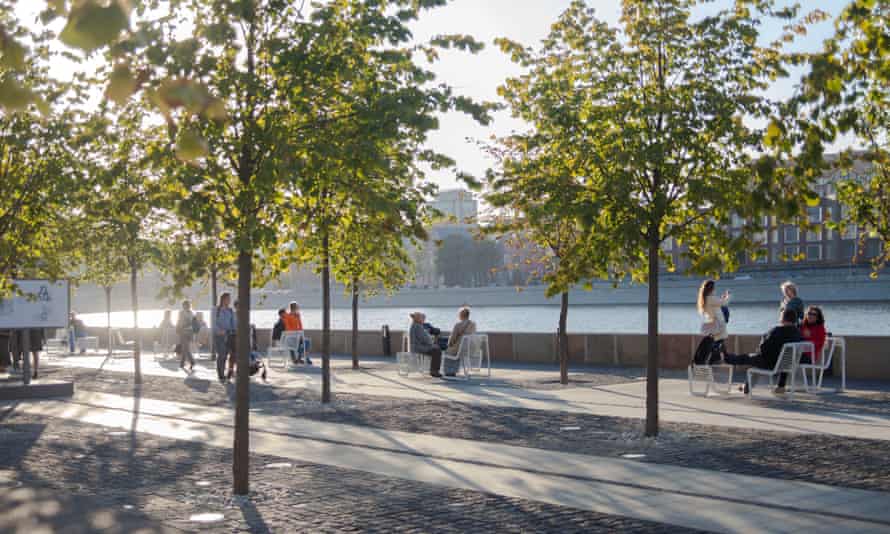
За пару лет ситуация в городе заметно изменилась в лучшую сторону. Велосипедистов стало намного больше. Люди постепенно начинают воспринимать велосипед как средство передвижения, а не как активный отдых. Не хватает адекватных велодорожек. Как и автомобилям, велосипедам было бы удобнее перемещаться по городу по отдельным маршрутам с минимальным количеством светофоров, пересечений с другими улицами. Ещё один минус - запрет провоза велосипедов в метро. Но в целом, мне кажется, что у Москвы есть все шансы стать если не велосипедным городом, то, по крайне мере, городом, где на байке можно без страха и серьёзных неудобств доехать из пункта А в пункт Б.
(In the last couple of years the situation has changed for the better. There are a lot more cyclists around, and people are starting to see a bicycle as a means of transport and not just recreation. There are no adequate bike lanes. It would be far easier both for cars and bikes to have separate lanes with minimum traffic lights or crossovers with other roads. Bikes are not permitted on the metro, and it's another drawback. But, on the whole, Moscow stands ever chance to become if not a cycling city but, at the very least, a city where you can get from A to B on your bike without fear or serious discomfort.)
- Deaddy Punk, via email
Сейчас, после 5 лет нового мэра на посту, самое время посмотреть, что произошло за этот период. Начнем с главного символа Собянинской эпохи – парка Горького. Велодорожки, кафе, субботники, концерты и другие мероприятия – все это было сделано членом новой мэрской команды Сергеем Капковым, который превратил прежде загибающийся парк аттракционов в подобие Лондонского Гайд-парка. Велосипедных дорожек, несмотря на громкие заявления, сделали всего несколько, и выполняют они скорее декоративную функцию. Еще одно нововведение нового правительства Москвы - приложение «Активный гражданин», девизом которого является «напрямую влиять на принимаемые властями решения», предлагает пользователям выбрать названия новых парков или цвет сидений стадиона, игнорируя такие важные моменты, как расширение зоны платной парковки, уменьшение количества больниц и поликлиник, введение платного въезда в город, необходимость выделенных полос для чиновников. И в этом вся «новая» Москва. За пышными цветами, новыми бордюрами и разноцветными сиденьями стадионов скрываются истинные проблемы города, которые со временем становятся только хуже ... Москва – это в какой-то мере отражение всей страны, и елси мы хотим что-то изменить, начинать стоит именно здесь.
(Now, after 5 years of the new mayor's ruling, it's the perfect time to review what happened during that period. We start with a main symbol of Mr Sobyanin's era – Gorky Park. Bicycle lanes, cafés, outdoor yoga, concerts and other activities – everything was brought to life under the Mayor's new team member Sergey Kapkov, who turned a once-depressing amusement park into something more like London's Hyde Park. Despite all the loud announcements, there are only a few bicycle lanes in the city, and they are mostly for decorative purposes. Another initiative of the new government team, a website and smartphone application called "Active citizen", billed as letting user "directly influence government decisions", asks users to choose names for new parks or the color of new stadium seats, ignoring such important problems as widening of toll parking zones, closure of hospitals, toll city entrance for private transport, and the need for special car lanes for state lawmakers. And this is what the "new" Moscow is about. Behind opulent vegetation, new pavement and colorful stadium seats, there are problems which are getting worse as time goes ... Moscow is, in a sense, a mirror of Russia, and if we want to change the country we have to start with the capital.)
- Olga Platunova, via email
Transportation has been partly improved for the last few years. But in some ways the situation is far from ideal. The positive thing is implementing reserved lanes for public transport. Buses and trolleybuses have gone faster. As a pedestrian I dislike that pavements have become narrower to give space for car parking.
It is good that for the last few years Moscow has got many new metro stations. It is good that new stations have got an elevator for disabled people. Unfortunately, old stations don't have such an option.
- Sergey Solomonov, via email
Obviously, the changes have been positive, the last city mayor has done a lot to improve the quality of life. For example, you see bikes everywhere now for rent. Parks are worth mentioning too. Unfortunately, Moscow is the only city in Russia where quality of life has been improved.
I believe that if we keep moving in the right direction, Moscow will keep improving. This year is rough though, with all the sanctions imposed on Russia. Moscow used to be a city fully of opportunities until recently. Now it's not easy to find a job and prices are very high on food, clothes etc. All in all, I hope that Moscow 2020 and further will be a better place to live in, economically stable and thriving.
- Ani Martirosyan, via email
- Is the 'Moscow experiment' over?
J Quality Inn, 555 N Center City Pkwy, Esco. Park in the Very Back of the Property. Room 118.
Source: https://www.theguardian.com/cities/guardianwitness-blog/2015/jun/13/urban-improvement-moscow-residents-thoughts-changes-regeneration
0 Response to "J Quality Inn, 555 N Center City Pkwy, Esco. Park in the Very Back of the Property. Room 118."
Post a Comment